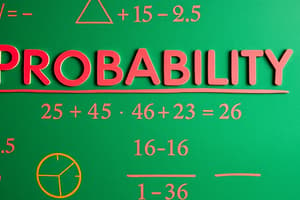Podcast
Questions and Answers
What is the main focus of Probability Theory?
What is the main focus of Probability Theory?
- Understanding uncertainty in predictions
- Describing the likelihood of events based on past occurrences (correct)
- Predicting future outcomes based on historical data
- Analyzing historical data
Why does Probability Theory play a key role in math statistics?
Why does Probability Theory play a key role in math statistics?
- To predict future data accurately
- To eliminate uncertainty in outcomes
- To ensure all outcomes are consistent
- To understand the level of certainty in data analysis (correct)
How does Probability Theory help in analyzing dice rolls in games like Monopoly?
How does Probability Theory help in analyzing dice rolls in games like Monopoly?
- Calculating the exact outcomes of each roll
- Ensuring players follow the rules
- Predicting the winner of the game
- Determining if dice are fair or loaded (correct)
What is one factor that mathematicians consider when analyzing probabilities of dice rolls?
What is one factor that mathematicians consider when analyzing probabilities of dice rolls?
How does Probability Theory help in understanding patterns observed in players' dice rolls?
How does Probability Theory help in understanding patterns observed in players' dice rolls?
Why is it important to analyze probabilities in games like Monopoly according to the text?
Why is it important to analyze probabilities in games like Monopoly according to the text?
Flashcards are hidden until you start studying
Study Notes
Math Statistics is a vast field that involves using statistical methods to make sense of data. One important aspect within this subject area is Probability Theory, which deals with the analysis of random phenomena through mathematical approaches. Here's some more information to help you understand how these two areas overlap:
Probability theory focuses on describing the likelihood of events occurring based on their past occurrence, meaning it uses historical data to predict future outcomes. It also examines the uncertainty involved when making predictions, such as how much confidence we can have in our prediction being accurate. In math statistics, probability theory plays a key role because if we want to analyze large amounts of data effectively, there will always be uncertainty attached to any outcome; so knowing what level of certainty we can have makes sense of those results.
For example, suppose we have a set of dice rolls from a game (like playing Monopoly), where each player takes one turn rolling six dice. We might notice patterns among players over several games—for instance, one person may consistently roll high numbers while another tends towards low ones. By analyzing these probabilities, mathematicians would consider factors like the dice being fair versus loaded or whether particular combinations were more likely due to chance alone without outside influences affecting them.
In summary, mathematics provides us with tools to describe uncertainties associated with observations so they can lead to better understanding about cause-effect relationships between variables. Statistical methods enable researchers to draw conclusions based upon observed data by utilizing models built around assumptions about underlying processes generating datapoints. Through combining the power of both disciplines into one cohesive approach known as 'statistics', investigators aim at providing actionable insights into complex situations involving many interacting elements whose behavior defies straightforward description otherwise.
Studying That Suits You
Use AI to generate personalized quizzes and flashcards to suit your learning preferences.




